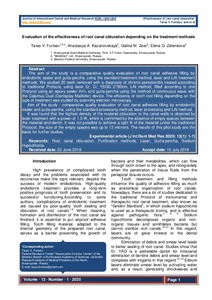Evaluation of the effectiveness of root canal obturation depending on the treatment methods
Автор:
Furtsev, Taras V.
Kazanovskaya, Anastasya A.
Zeer, Galina M.
Zelenkova, Elena G.
Коллективный автор:
Политехнический институт
Кафедра конструкторско-технологического обеспечения машиностроительных производств
Кафедра материаловедения и технологии обработки материалов
Дата:
2020Журнал:
Journal of International Dental and Medical ResearchКвартиль журнала в Scopus:
Q3Библиографическое описание:
Furtsev, Taras V. Evaluation of the effectiveness of root canal obturation depending on the treatment methods [Текст] / Taras V. Furtsev, Anastasya A. Kazanovskaya, Galina M. Zeer, Elena G. Zelenkova // Journal of International Dental and Medical Research. — 2020. — Т. 13 (№ 1). — С. 1-7Аннотация:
The aim of the study is a comparative quality evaluation of root canal adhesive filling by endodontic sealer and gutta-percha, using the standard treatment method, laser and LAI treatment methods. We studied 20 teeth removed with a diagnosis of chronic periodontitis treated according to traditional Protocol, using laser Er; Cr; YSGG 2780nm, LAI method, filled according to one Protocol using an epoxy sealer AH+ and gutta-percha using the method of continuous wave with the Calamus Dual (Dentsplay Maillefer) device. The efficiency of tooth root filling depending on the type of treatment was studied by scanning electron microscopy. Aim of the study - comparative quality evaluation of root canal adhesive filling by endodontic sealer and gutta-percha, using the standard processing method, laser processing and LAI method. It was found that the highest density of the material obturation to the canal walls is obtained by laser treatment with a power of 1.5 W, which is confirmed by the absence of empty spaces between the material and dentin. It was not possible to achieve a tight fit of the material under the traditional Protocol, the size of the empty spaces was up to 13 microns. The results of this pilot study are the basis for further studies. © 2020 University of Dicle.

